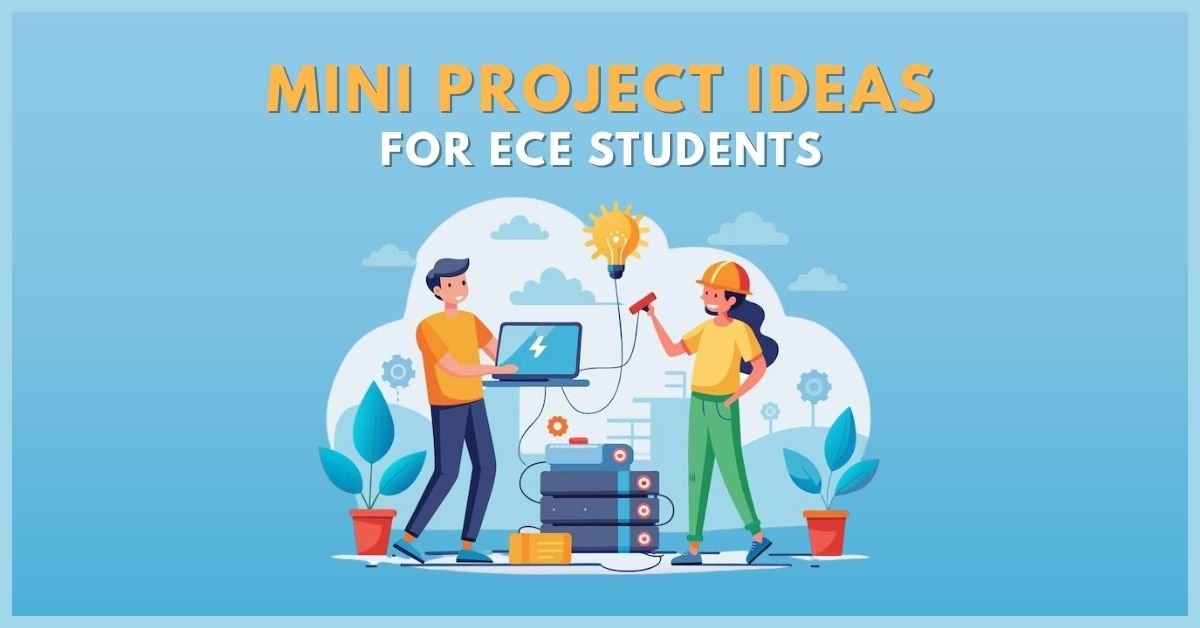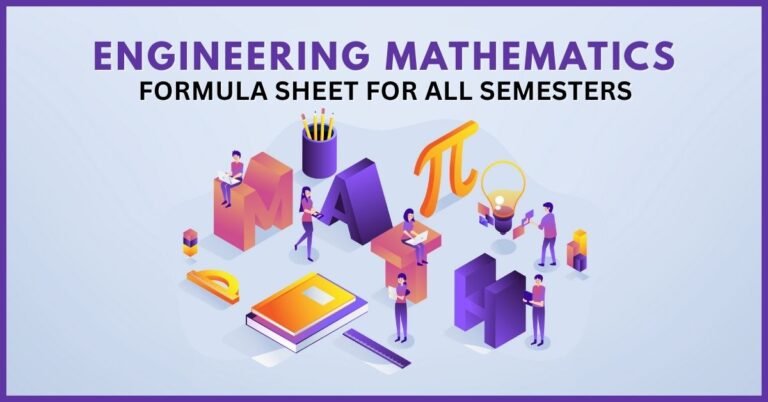Mini Project Ideas for ECE Students

Electronics and Communication Engineering (ECE) students often face the challenge of choosing the right mini project. Whether it’s for lab work, semester submissions, or skill-building, a well-chosen project can not only help you score marks but also give you hands-on exposure to real-world electronics concepts.
In this article, we’ve compiled 50+ mini project ideas for ECE students ranging from simple beginner-level circuits to advanced projects involving microcontrollers, IoT, and wireless communication. These projects are practical, easy to implement, and can boost your resume for placements.

Why Mini Projects Are Important for ECE Students
Mini projects serve as a bridge between theoretical knowledge and practical implementation. Here’s why they matter:
- Enhance hands-on skills in electronics and programming.
- Improve understanding of circuit design and debugging.
- Act as resume boosters during interviews and placements.
- Help students explore fields like IoT, VLSI, Embedded Systems, and Communication.
- Build confidence to take on major/final-year projects.
How to Choose the Right Mini Project
Before jumping into the ideas, here are a few quick tips for selecting the best project:
- Match with your interest – Choose a project related to your favorite subject (digital electronics, communication, embedded systems, etc.).
- Keep it simple – For mini projects, avoid overly complex designs.
- Use available components – Select projects with easily available ICs, sensors, and microcontrollers.
- Think about scalability – Pick something that can later be expanded into a major project.

50+ Mini Project Ideas for ECE Students
We’ve categorized the projects into sections for easy navigation.
Basic Electronics Mini Projects
These are ideal for beginners who want to strengthen their foundation in electronics.
- Automatic street light using LDR
- Digital dice using 555 timer
- Clap switch circuit
- Water level indicator
- Touch-sensitive switch
- Traffic light controller using 555 timer
- Simple electronic voting machine
Embedded Systems Projects
These projects use microcontrollers like Arduino, PIC, or ARM processors.
- Arduino-based digital thermometer
- Smart home automation using Arduino
- Speed control of DC motor using PWM
- GSM-based notice board
- RFID-based door lock system
- Arduino-controlled robotic arm
- Bluetooth-based home automation
Communication-Based Projects
Since communication systems are the backbone of ECE, these projects are highly relevant.
- FM transmitter and receiver circuit
- Wireless power transfer system
- Li-Fi data transmission system
- IR remote control circuit
- Walkie-talkie using RF modules
- Mobile controlled robot using DTMF
- Bluetooth audio transmitter
Sensor-Based Projects
These projects are excellent for Internet of Things (IoT) and automation.
- Gas leakage detector using MQ-2 sensor
- Fire alarm system using temperature sensor
- Smart parking system using ultrasonic sensors
- Smart blind stick for visually impaired
- Smart irrigation system with soil moisture sensor
- Temperature and humidity monitor using DHT11
- PIR sensor-based motion detector
IoT and Smart Systems Projects
IoT-based projects are in demand for placements and industry applications.
- IoT weather monitoring system
- IoT smart energy meter
- IoT-based smart garbage bin
- Home automation using NodeMCU (ESP8266)
- IoT-based health monitoring system
- Smart street lighting with IoT
- IoT water quality monitoring system
Robotics and Automation Projects
These projects are fun to build and great for showcasing technical creativity.
- Line-following robot
- Obstacle-avoiding robot
- Voice-controlled robot using Arduino
- Pick and place robotic arm
- Gesture-controlled robot
- Fire-fighting robot
- Maze-solving robot
Power Electronics Projects
Power electronics is a vital area in ECE. These projects involve converters, inverters, and controllers.
- Solar-powered mobile charger
- Automatic battery charger circuit
- Inverter design using MOSFET
- Solar tracking system
- Smart energy saver circuit
- UPS design for home appliances
- Power factor improvement system
VLSI and Digital Electronics Projects
If you’re interested in chip design and digital circuits, these projects are useful.
- Digital clock using counters
- BCD to 7-segment display circuit
- Sequence detector using flip-flops
- ALU (Arithmetic Logic Unit) design
- Digital traffic light system
- Priority encoder circuit
- Multiplexer-based logic circuits
Final-Year Oriented Mini Projects
If you want to use your mini project as a stepping stone for a major project, these are recommended.
- IoT-based patient health monitoring system
- AI-based voice assistant with Arduino
- Smart security system with face recognition (using Raspberry Pi)
- Smart greenhouse automation system
- Drone-based surveillance project
- IoT-based smart city system
- Real-time vehicle tracking system using GPS and GSM
Useful Tips for Successful Project Implementation
- Plan before you start – Draw the circuit diagram and understand each block.
- Use simulation tools – Proteus, Multisim, or Tinkercad for testing before hardware implementation.
- Document everything – Maintain a project report with circuit diagrams, code, and results.
- Work in teams – Share tasks for faster progress and better learning.
- Demonstrate clearly – Practice explaining your project for viva and presentations.
Frequently Asked Questions (FAQs)
1. What are the best mini projects for ECE beginners?
Beginners can start with simple circuits like automatic street lights, water level indicators, or clap switches before moving to microcontroller-based projects.
2. Which mini project is best for final-year ECE students?
IoT-based projects such as smart health monitoring, smart home automation, or real-time vehicle tracking are ideal for final years.
3. Do mini projects help in placements?
Yes, projects demonstrate practical knowledge and problem-solving skills, which recruiters value during interviews.
4. Can mini projects be done without coding?
Yes, basic circuit projects like LDR-based light control, gas sensors, and water level indicators can be built without coding.
5. Which platforms are best for implementing ECE mini projects?
Platforms like Arduino, Raspberry Pi, NodeMCU, and Proteus simulation tools are widely used in ECE projects.
Conclusion
Mini projects are not just an academic requirement but also a great way to build confidence, sharpen skills, and prepare for real-world engineering challenges. Whether you’re a beginner in electronics or aiming for a high-impact final-year project, the ideas listed above will help you get started.
Choose a project that excites you, experiment with circuits, and don’t be afraid to make mistakes—that’s where the real learning happens.
Author Profile
- At Learners View, we're passionate about helping learners make informed decisions. Our team dives deep into online course platforms and individual courses to bring you honest, detailed reviews. Whether you're a beginner or a lifelong learner, our insights aim to guide you toward the best educational resources available online.
Latest entries
 UncategorizedOctober 3, 2025AKTU BTech Important Questions & Notes
UncategorizedOctober 3, 2025AKTU BTech Important Questions & Notes Exam Revision NotesSeptember 24, 2025C++ Programming Cheatsheet – STL, OOP Concepts, Syntax
Exam Revision NotesSeptember 24, 2025C++ Programming Cheatsheet – STL, OOP Concepts, Syntax Exam Revision NotesSeptember 22, 2025Java Programming Cheatsheet – Collections, OOP, Exceptions
Exam Revision NotesSeptember 22, 2025Java Programming Cheatsheet – Collections, OOP, Exceptions UncategorizedAugust 28, 2025BTech 1st Year Notes & Cheatsheets (Subject-Wise)
UncategorizedAugust 28, 2025BTech 1st Year Notes & Cheatsheets (Subject-Wise)







